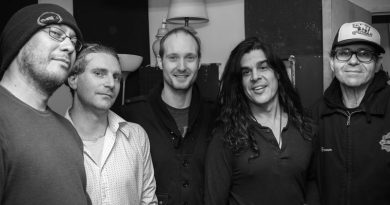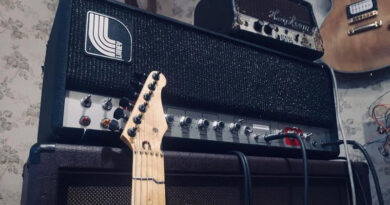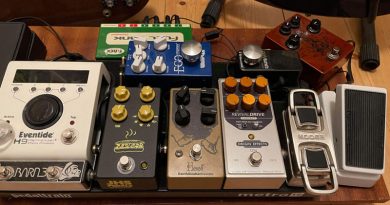In Search Of Tone: Lincoln Durham
I’m one of those annoying fans that likes to meet the artists and get my albums signed. I’ve been a fan of Lincoln Durham for a few years but I haven’t had the privilege of seeing him live yet so unfortunately the opportunity to meet hasn’t arisen but given the chance to interview him and talk about how he creates his music, for the moment anyway, makes up for it.

He’s a super cool guy, writes some outstanding songs and I was grinning ear to ear after speaking to him. He went into great detail about his writing process and even discussed his future plans of adding a drummer making me intrigued to hear, and hopefully see, the epic music they will no doubt create as a duo.
Thank you doing this interview, my wife and I have been fans for a few years now. I’m excited to hear your perspective so let’s jump right in with gear. What amps are you using?
I mainly use Fender amps. When I first started, I was playing an old Bell Howell amp which is like an old 1940s speaker they turned into an amp. But from there I moved onto Fender Musicmasters which were practice based amps. I played that for years. I had two of them for a while but then I used a Fender Concert amp which was a weird beastly 80s amp. I’m trying to remember all this stuff [laughs], it’s been a year since I pulled all this shit out [laughs].
I’ve been playing a Fender ‘65 Deluxe Reverb, that’s been my favorite amp…
More recently, I’ve been playing a Fender ‘65 Deluxe Reverb, that’s been my favorite amp. The Musicmasters have been great amps and I still think they are great for recording, but the thing with the ’65 Deluxe Reverb, is that live I was trying to get the biggest, fullest tone I could and a lot of amps with big tone came with a lack of brightness. I was getting a lot of beef and thickness but not enough treble. I like both aspects of the tone, the heavy bass and the crisp edginess. The Concert amp was great for the beefy tones but didn’t have that punch I was looking for. The Deluxe Reverb was the first amp I found to have both ends of the spectrum I was looking for. Also, with the Resonator I play it’s almost impossible for it to feedback through that amp.
I know you’re playing drums as well as guitar and singing, so it’s hard to use pedals. Are you using any pedals, or do you get your tones from the amp?
Yeah I have pedals. I can’t switch very much during a song but between songs I use my pedals to change up the sound. On occasions, if there is a break in the drumming, I can use a pedal for a big raging part I’d want to do.
Now, I will say I used to keep all this information under wraps, especially in the one man band realm you don’t want to give away the secrets of the trade [laughs], but, now I don’t think that matters as much. I do what I do and that’s my style of songwriting. But, in terms of ‘one man bandness’, there are people out there that are just amazing. I’m not anything compared to some. I pride myself on songwriting and the live shows. As far as my rank amongst the one man band community, there are people out there that can play a whole drum set, a bass line and everything else. So screw it, it’s not like I have some great trade secret.
I used to keep all this information under wraps, especially in the one man band realm you don’t want to give away the secrets of the trade…
What I use pedal wise is, I have a Boss Octave pedal that I would octave my guitar down to a bass amp. I would split the signal where one would go clean to the rest of my pedals and then to my guitar amp, and the other signal would go to the bass amp. It would allow me to get that thickness while maintaining the guitar sound as well. Through the initial signal, I run my pedalboard. My favorite pedal is a Durham Electronics Mucho Booster (not related to me) but he lives here in Austin TX.
He makes the most amazing pedals. The Sex Drive is one of the most popular pedals and a lot of guitarists, especially the understated cool guitar type stuff, uses them. It’s a pure boost without compression. It’s got a beautiful tube breakup sound to it. The Mucho Boosto is very similar. It’s like the Sex Drive’s drugged out brother [laughs]. Its heavier and meaner and it’s the one I keep on all the time. I don’t turn it all the way up, just enough crunch and it does have some compression. That’s how I get the constant state of slight to heavy grit.
For some stuff, I play those Cigar Box guitars and my Axe guitar, which are unapologetically punk rock. For those I use a bass Big Muff because it has three switches. It has a low octave setting, regular, which sounds like a regular Big Muff and then a blend option which is really cool. It blends your octave and pure signal, and it gives you a fuzzy trashiness of the Big Muff with the original signal. It creates more depth which is great when its only you on stage. I think that’s about all I use other than an EQ pedal. The EQ is a simple thing but I use it for everything. It really helps when using the Cigar Boxes as well. When I do the clean acoustic stuff, I would just turn everything off and use a clear dry signal.
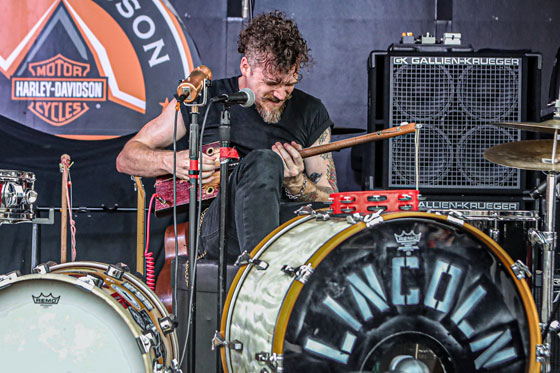
What brought you down the Cigar Box path?
Originally, I saw this guitar at my local guitar shop South Austin Music. It was sitting in the corner and I was about to go on tour and open for James McMurtry. I saw it and thought of it as a challenge. How much noise could I make out of that thing. I bought it for $80 and no song I had would really work for it, so I wrote one which is Annie Departee. I plugged it in and really played it for the first time on tour which worked out well for me, but I don’t recommend trying something for the first time on stage [laughs]. Luckily, it worked.
It wasn’t my intent to use the Cigar Box but It’s been fun and I started to become known for that. Fans then started making them for me and bringing them to shows, which is really cool. So, most of the ones I have were built by fans. This one guy in the Pennsylvania area made me two of them. One is still in the rotation today. The first one he made me go bumped because of the newer one he made me, and it has frets to it’s a little easier [laughs]. So yeah, people made them for me and I just add them to the set.
It wasn’t my intent to use the Cigar Box but It’s been fun and I started to become known for that…
That’s awesome, what other guitars do you have?
The other fun guitar I have is my Axe. It’s another one string guitar and it actually took the place of the one I showed you earlier because its cooler, I mean it’s an actual axe [laughs]. The guy who owns the company Square Amps made that it for me. He makes crazy wacky amps out of old 1940s radios and stuff like that. But, in the normal world of guitars, the old tried and true I play is a Brass Resonator. It’s an old Hohner Resonator that they made for only a few years and I’ve tried finding another but I haven’t yet. That’s what I’ve played since the very beginning of my professional career.
The original acoustic guitar I’ve used and still do today is an old Gibson J45. I also have a Fender pickup in my acoustic, as well as the resonator. I had my guitar guy Ben cut a hole in it and put a Fender Strat pickup in because I wanted that depth and extra copper winding [laughs].
The newest thing I got because I was getting louder, trying new things and the resonator couldn’t do some of that, was an Epiphone Century. I like the simple guitars. It has 1 P90 pickup and it’s an archtop. I think it’s called Century because it was mimicking an old turn of the century style archtop guitar. That’s my main guitar now.
The original acoustic guitar I’ve used and still do today is an old Gibson J45…
What else do I play? Oh yeah, I have a banjo and a fiddle I play occasionally. I used to play them in the earlier days and I’ll bring them out more now I’ll have some breathing room with the drummer. My dad actually made it for me when I was a teenager. All these instruments will run through the same effects as well.
Every time I go somewhere, the sound engineer would ask ‘do you needed a DI for that?’ I would always reply with ‘no thanks I will run it through the rig’. They respond with saying ‘you don’t get feedback from doing that?’ Nah, I have it all down to a science [laughs]. I would run my banjo, fiddle, everything through my rig and the little tweaks and adjustments I make to the pedals will make it all ok.
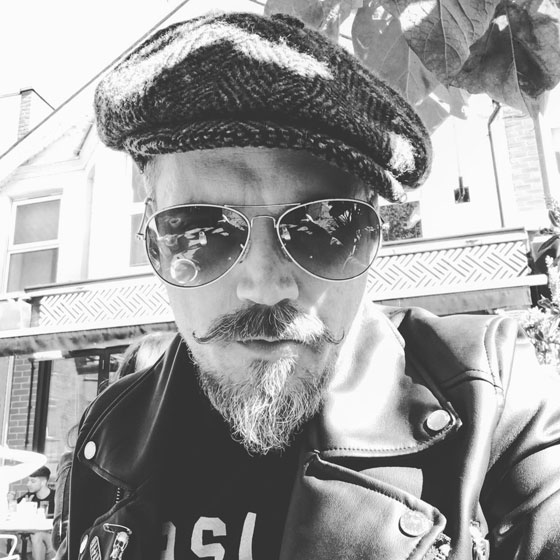
Interesting. I think you have a great overall sound and I really love your songwriting. What is your writing process like?
For me it’s different every time, but it’s also a constant. As much as I try to stay focused, I’m in a constant state of daydreaming all the time. In that there are song ideas forming and floating around. Occasionally, one will float right in front of my eyes, I’ll grab it and make a song out of it. I never set out to write a song. If I set aside time to write and said this is my songwriting time, I would never write a song. That’s not how I work and for me that’s a sure way of writers block. I have to not be thinking about writing a song for something to pop up. Once that fragment of an idea presents itself, then I sit down and write. But the initial conception of it has to fall out of the universe somewhere.
Lately, and by lately, I mean the last 3-4 years, a lot of these ideas come to me in the shower. I think that’s because it’s a sensory deprivation type of environment. I have bad ADHD and, in that time, there’s nothing to catch my attention and I’m usually just relaxing. It’s in this time that a tune, melody or phrase will pop into my head. At that point I’ve got it, and the rest of the song will just flow out of that easily. However, most of my songs aren’t even written down because I’m obsessive enough to keep working it in my head, so I remember it. For example, just driving to the store I’ll continue to think and write more parts of the song as I’m driving. There’s not real rhyme or reason to how I do it, I’m usually just always thinking about it and sometimes it becomes tangible.
most of my songs aren’t even written down because I’m obsessive enough to keep working it in my head…
I’ve heard that frequently. Nick DiSalvo from Elder told me in a previous interview that a lot of his songs came from vacuuming at his old job.
It’s the monotony and the white noise that is really perfect for writing songs.
How do you go about creating unique music without repeating yourself or others?
That gets hard, I’ve been doing this for 12 years and I’m finishing up my 5th record. It’s no repertoire like The Stones or anything but it’s probably 60 songs. At that point it starts getting really difficult to create unique songs. Especially, when you have a style of playing. I wasn’t looking to have a style of playing; I just always did what my fingers and voice did because that’s what I could do [laughs]. It becomes difficult because you only have so many tools to work with.
For me at 60 plus songs it’s difficult to think outside the box. I’ve repeated a couple of vibes sometimes from previous songs. A lot of people do it. Some big shots have songs that sound similar to previous efforts, and you don’t know you’re doing it [laughs]. If you’re not a studio musician who can do anything, then it’s hard because you’re working within the parameters of your ability. That’s how you get your vibe and style, but it also constrains you to what you can do. I can try and write a jazz song and that would sound different than anything I’ve done but I’m only working with my abilities and I’m not great at writing jazz [laughs].
To answer your question, I always do keep that in mind. If I find, before its recorded and on the album, that it sounds similar, then I will try to come up with an alternate way to play that part. Maybe strum instead of picking, switch up the strum pattern or any little idea to alter the sound. Or maybe even slowing it down or speeding it up. I’ve done that numerous times actually.
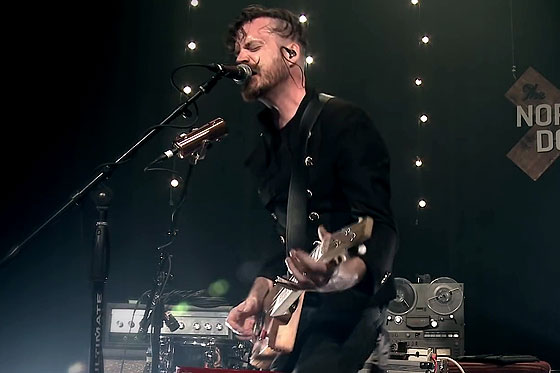
I have more off days than on and often get discouraged with my tone or playing and will put the guitar down for a while. What do you do if you’re having an off day and how do you get inspired to play again?
Personally, if I’m having an off day, I try to walk away if I can. Over the years I’ve learned that if I keep trying to make it perfect, it will just get worse and worse. I also don’t want that negative feeling attached to my art. So, I know if I’m not vibing that day I’ll walk away and try again. But, if you’re on tour then you just do your thing because you can’t walk away. If you have the ability to take a break when you’re practicing or rehearsing, then that’s ideal.
Even as a one man band, I would rehearse. I would go to the rehearsal studio. 1) Because I don’t want to do that to my neighbors [laughs] and 2) because I like to do the full thing. There are lots of little bits and pieces that need to work together when I play, so I would insist on setting up my entire rig, just like at a show and rehearse that way. But if I was having a bad day, rather than practice through it, because I wanted to get the practice in, I would just call it a day. If not, then I would get more frustrated and more and more in my head.
Music is such an in your head thing, that you can easily snake bite yourself. Where you get worried about something and that’s guaranteed to happen, then it will become a problem and will always happen. It’s such a mental thing. So, when I’m in a better mood and better light, I’ll go back to it. There are always ups and downs, it doesn’t matter how much you do it. I practice constantly and still fuck up a lot [laughs]. Every show and every day are different, some are great, and some aren’t.
most of my songs aren’t even written down because I’m obsessive enough to keep working it in my head…
I don’t think you have a bad song but currently Hero is one of my favorites and I’ve had that on repeat for a while now. Do you have a song or part of a song that you’re particularly proud of?
Honestly, I’m most proud of my lyrics. I’ve always wanted to be lyric forward. I’m a big fan literature and I wanted my stuff to have that substance. To be honest as well, my style is something I get tired of sometimes [laughs], but the lyrics I’m always proud of. In particular Beautifully Sewn, Violently Torn, which may not be the most popular of songs but I’m extra proud of those lyrics. I think that was exactly what I wanted, to be as a lyricist. It’s not a pretty song or a ragey cool fun song, but the lyrics are at the top of my game I think.
Do you typically write the music or the lyrics first?
It’s a mix of both. For the most part, most of my songs come together at the same time. So maybe I’ll have the lyrics and melody of a chorus at the same time. To go back to earlier as well, sometimes I’ll listen and think its sounds too similar so I’ll keep the lyrics and change up the melody. That happens often. Most of the better songs just flow out but sometimes what I do is, I have a journal and If I come up with a phrase that’s cool I’ll write it down. If I’m not feeling creative, I’ll look back through and be able to connect some phrases and ideas I wrote. A few songs came out of this process and there is usually a connective strain of thoughts from these ideas written in the journal, even if it’s on page 10 and page 100.
On occasion, I’ll have a melody in my head that I really like, and I’ll scat over that. I won’t say word, just nonsense and that will start some ideas. This may get way too in depth but there’s something about how a particular word works at a particular beat. It could be the perfect phrasing for the melody and the word is not a word but a noise you make while scatting. So, if you substitute a soft word into the hard area is doesn’t work. It’s not just about what the word is saying but how the word sounds as well.
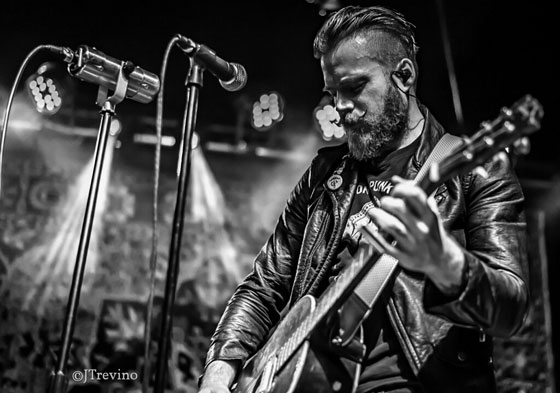
It’s like another instrument?
Yes, so I’ll have this gibberish that works well and subconsciously a word may fit in as well and I can write around those words that work. It’s weird but the spontaneous writing sparks some great ideas. I couldn’t do it in front of anyone or on command like a party trick [laughs] but it works for myself.
Do you have a practice routine or warm-ups that you do daily?
Pre-COVID, 1-2 times a week I would go to the rehearsal studio and run through a set though. I don’t enjoy practicing but it’s something I’m also obsessed with to stay on my toes. Other than that no I don’t. I try to not make anything a task. It started to get that way after 10 years of touring. It’s one of the reasons we took a little break which unfortunately, became a much longer break.
bringing in a drummer is also sparking some creativity…
I try not to do anything regimented because I don’t want it to become something I dread doing. If I feel like grabbing the guitar I will. I’ve heard this frequently and unfortunately COVID has left a lot of people stagnant and uninspired. I had an album almost done and this has kind of depressed the inspiration out of me for some time. I recently dusted off the album and have a spark in me again however. I haven’t been regimented to do anything in some time and when I feel like it again, I will write more.
Hopefully soon because we all need more music from you for sure!
Music for sure! That will always come out of me. A part of shaking things up, bringing in a drummer is also sparking some creativity because I feel I have run to the edge of what I could do myself and having a drummer will free me up on stage a bit and allow me to bring a new energy to the live shows. I’m excited for what’s to come and I want it to be about the music.
Label: Droog Records
Band Links: Official | Facebook | Twitter | Instagram
Interviewed by: Josh Schneider

